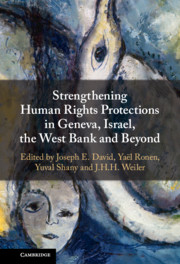103 results
Introduction
-
- Journal:
- Israel Law Review / Volume 57 / Issue 1 / March 2024
- Published online by Cambridge University Press:
- 08 March 2024, pp. 1-3
- Print publication:
- March 2024
-
- Article
- Export citation
Introduction
-
- Journal:
- Israel Law Review / Volume 56 / Issue 3 / November 2023
- Published online by Cambridge University Press:
- 04 January 2024, pp. 289-291
- Print publication:
- November 2023
-
- Article
- Export citation
Introduction
-
- Journal:
- Israel Law Review / Volume 56 / Issue 2 / July 2023
- Published online by Cambridge University Press:
- 07 June 2023, pp. 141-142
- Print publication:
- July 2023
-
- Article
- Export citation
Digital Rights and the Outer Limits of International Human Rights Law
-
- Journal:
- German Law Journal / Volume 24 / Issue 3 / April 2023
- Published online by Cambridge University Press:
- 22 May 2023, pp. 461-472
-
- Article
-
- You have access
- Open access
- HTML
- Export citation
5 - Assessing the Effectiveness of the International Court of Justice
- from Part I - The Role of the ICJ
-
-
- Book:
- The Cambridge Companion to the International Court of Justice
- Published online:
- 18 May 2023
- Print publication:
- 06 April 2023, pp 101-120
-
- Chapter
- Export citation
Introduction
-
- Journal:
- Israel Law Review / Volume 56 / Issue 1 / March 2023
- Published online by Cambridge University Press:
- 20 March 2023, pp. 1-2
- Print publication:
- March 2023
-
- Article
- Export citation
Introduction
-
- Journal:
- Israel Law Review / Volume 55 / Issue 3 / November 2022
- Published online by Cambridge University Press:
- 11 November 2022, pp. 213-214
- Print publication:
- November 2022
-
- Article
- Export citation
Kent Roach , Remedies for Human Rights Violations – A Two Track Approach to Supra-National and National Law, Cambridge University Press, 2021, 632 pp., ISBN 978-1-108-41787-7, £99.99
-
- Journal:
- Leiden Journal of International Law / Volume 35 / Issue 4 / December 2022
- Published online by Cambridge University Press:
- 18 August 2022, pp. 1029-1032
- Print publication:
- December 2022
-
- Article
- Export citation
Introduction
-
- Journal:
- Israel Law Review / Volume 55 / Issue 2 / July 2022
- Published online by Cambridge University Press:
- 24 June 2022, pp. 105-106
- Print publication:
- July 2022
-
- Article
- Export citation
Introduction
-
- Journal:
- Israel Law Review / Volume 55 / Issue 1 / March 2022
- Published online by Cambridge University Press:
- 28 January 2022, pp. 1-2
- Print publication:
- March 2022
-
- Article
- Export citation
Introduction
-
- Journal:
- Israel Law Review / Volume 54 / Issue 3 / November 2021
- Published online by Cambridge University Press:
- 09 September 2021, pp. 287-288
- Print publication:
- November 2021
-
- Article
- Export citation
8 - Rule of Law De Jure and/or De Facto?
-
-
- Book:
- Strengthening Human Rights Protections in Geneva, Israel, the West Bank and Beyond
- Published online:
- 13 August 2021
- Print publication:
- 26 August 2021, pp 179-198
-
- Chapter
- Export citation
Index
-
- Book:
- Strengthening Human Rights Protections in Geneva, Israel, the West Bank and Beyond
- Published online:
- 13 August 2021
- Print publication:
- 26 August 2021, pp 264-268
-
- Chapter
- Export citation
Copyright page
-
- Book:
- Strengthening Human Rights Protections in Geneva, Israel, the West Bank and Beyond
- Published online:
- 13 August 2021
- Print publication:
- 26 August 2021, pp iv-iv
-
- Chapter
- Export citation
Contents
-
- Book:
- Strengthening Human Rights Protections in Geneva, Israel, the West Bank and Beyond
- Published online:
- 13 August 2021
- Print publication:
- 26 August 2021, pp v-vi
-
- Chapter
- Export citation
Contributors
-
- Book:
- Strengthening Human Rights Protections in Geneva, Israel, the West Bank and Beyond
- Published online:
- 13 August 2021
- Print publication:
- 26 August 2021, pp vii-viii
-
- Chapter
- Export citation
David Kretzmer: Selected Publications
-
- Book:
- Strengthening Human Rights Protections in Geneva, Israel, the West Bank and Beyond
- Published online:
- 13 August 2021
- Print publication:
- 26 August 2021, pp 258-263
-
- Chapter
- Export citation

Strengthening Human Rights Protections in Geneva, Israel, the West Bank and Beyond
-
- Published online:
- 13 August 2021
- Print publication:
- 26 August 2021
Introduction
-
- Journal:
- Israel Law Review / Volume 54 / Issue 2 / July 2021
- Published online by Cambridge University Press:
- 07 June 2021, pp. 141-142
- Print publication:
- July 2021
-
- Article
- Export citation
Introduction
-
- Journal:
- Israel Law Review / Volume 54 / Issue 1 / March 2021
- Published online by Cambridge University Press:
- 15 January 2021, pp. 1-2
- Print publication:
- March 2021
-
- Article
- Export citation



